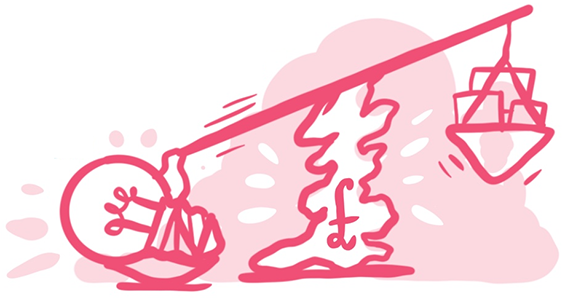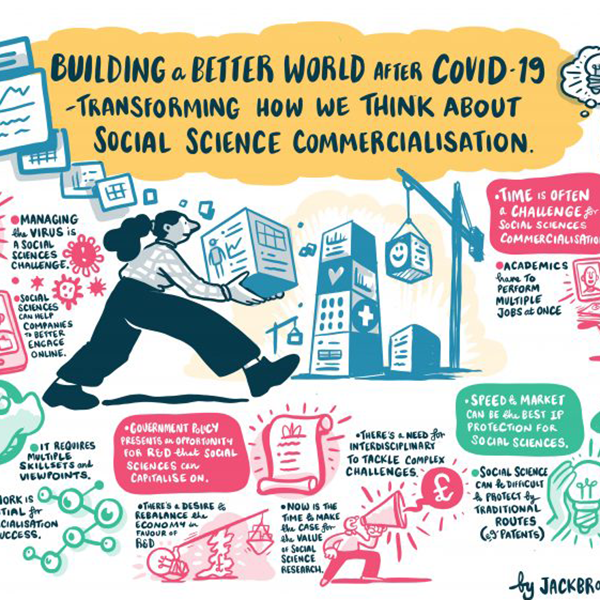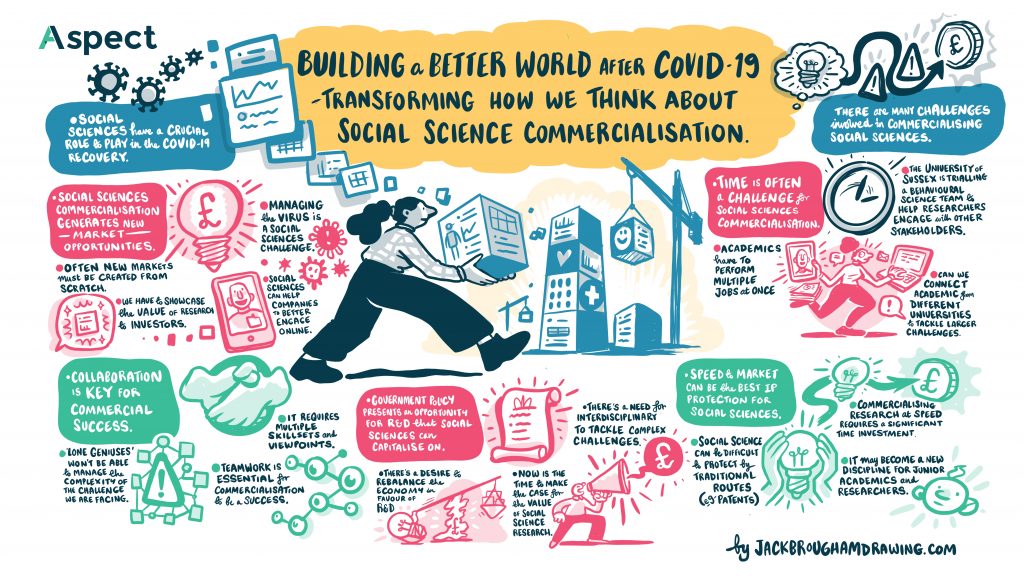Webinar recording
Panel members
- Professor Julia Black (Chair) – Strategic Director of Innovation & Professor of Law at the LSE, & Chair of the Aspect Steering Group
- Professor Tom Ormerod – Director of Applied Behavioural Science, University of Sussex
- Don Spalinger – Managing Director, PDT International Ltd & Director, ICURe Programme
- Rosalind Lowe – Head of Policy and Engagement at the National Centre for Universities and Business
Session highlights
Slide deck
Session summary
Social sciences have a crucial role to play in the COVID-19 recovery, and in addressing many other challenges society faces. This session explored the challenges involved in commercialising social sciences research and some of the strategies for overcoming them, as well as the opportunities for social sciences in the current environment and its importance in creating impactful and sustainable solutions.
Some key messages were:

Social sciences commercialisation generates new market opportunities. Unlike traditional STEM disciplines, the commercialisation of SHAPE subjects (social sciences, humanities and arts) often needs to carve out new markets from scratch. For example, virus management is as much a social science challenge (e.g. compliance, mental health, behavioural management, policy adoption) as it is a medical challenge (e.g. vaccine discovery). However, currently investors and potential clients are often less aware of the value of social science research and so require researchers and KEC teams to define and showcase the new market opportunities. An example of a social science new market opportunity created by COVID-19 is the dramatic shift to the online world. Social scientists can ensure that online training and interventions (e.g. medical remote check-ups) are as effective as possible creating huge potential value for the healthcare system.

Collaboration is key for commercial success. We need to move beyond the idea of a ‘lone genius’ and recognise that a complex challenge, such as taking research and commercialising it, requires multiple skills and viewpoints that go beyond the abilities of a single person. Therefore, teamwork is absolutely critical for commercialisation success, and the ability to work collaboratively and coordinate multiple skillsets, talents and viewpoints is a skill that researchers will need in order to lead effective commercialisation teams.

Government policy is creating a ‘once in a generation opportunity’ for R&D that social sciences can capitalise on. There is government consensus that the UK economy requires rebalancing towards a more research-based economy. The Government’s target of increasing public and private sector spending on R&D to reach 2.4% of GDP by 2027 is an ambitious target, but social sciences can use this as an opportunity to make a strong case for the value of social sciences, both on its own and in conjunction with STEM, and the need for interdisciplinary teams to tackle interdisciplinary challenges.

Time is often the limiting factor for social science research commercialisation. Academics are under pressure to perform multiple jobs simultaneously (e.g. researcher, teacher and administrator) and so a lack of time can limit their ability to engage with commercialisation. One potential solution, trialled at the University of Sussex, is to develop a sector specific consortium of experts. The Applied Behavioural Science (ABS) organisation brings together experts in behavioural solutions who can collectively provide businesses, government and NGOs with advice and other services. This helps to save time for the individual academics and provides a bespoke support service that is more efficient. Ultimately it would be exciting for similar organisations to connect academics from multiple universities who can be called on in a coordinated manner to tackle even bigger challenges.

Speed to market can be the best IP protection for social sciences. Social science research can be challenging (but not impossible) to protect by traditional routes e.g. patents. The lack of effective intellectual property protection means speed to market and establishing the brand as a primary service provider is critical to success. This contrasts with the traditional STEM routes to commercialisation, where patent law gives researchers a long protection period to commercialise their innovation. However, commercialising research at speed requires time and dedicated focus that most senior academics prioritise using for their research rather than a business idea. One solution is to develop a team of junior academics or PhD students who can view commercialisation and entrepreneurship as an alternative to the traditional research career and quickly progress the idea into the marketplace.





